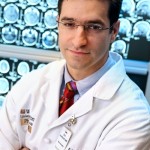Leuthardt to speak at ViSE Seminar Series, Monday January 27, 5:15pm
Center for Innovation in Neuroscience and Technology: Developing Models for Innovation in Academic Neurosurgery
Speaker: Eric C. Leuthardt, M.D. Washington University School of Medicine in St. Louis

Date: Monday January 27th
Time: 4:30 Social, 5:15 Seminar Start
Place: 134 “Jacobs Believed in Me” Auditorium (FGH) and Atrium
There is currently an acceleration of new scientific and technical capabilities that create new opportunities for academic neurosurgery. To engage these changing dynamics, the Center for Innovation in Neuroscience and Technology (CINT) was created on the premise that successful innovation of device-related ideas relies on collaboration between multiple disciplines. The CINT has created a unique model that integrates scientific, medical, engineering, and legal/business experts to participate in the continuum from idea generation to translation.
OBJECTIVE: To detail the method by which this model has been implemented in the Department of Neurological Surgery at Washington University in St. Louis and the experience that has been accrued thus far.
METHODS: The workflow is structured to enable cross-disciplinary interaction, both intramurally and extramurally between academia and industry. This involves a structured method for generating, evaluating, and prototyping promising device concepts. The process begins with the “invention session,” which consists of a structured exchange between inventors from diverse technical and medical backgrounds. Successful ideas, which pass a separate triage mechanism, are then sent to industry-sponsored multidisciplinary fellowships to create functioning prototypes.
RESULTS: After 3 years, the CINT has engaged 32 clinical and nonclinical inventors, resulting in 47 ideas, 16 fellowships, and 12 patents, for which 7 have been licensed to industry. Financial models project that if commercially successful, device sales could have a notable impact on departmental revenue.
CONCLUSION: The CINT is a model that supports an integrated approach from the time an idea is created through its translational development. To date, the approach has been successful in creating numerous concepts that have led to industry licenses. In the long term, this model will create a novel revenue stream to support the academic neurosurgical mission.
Eric C. Leuthardt, M.D. is a neurosurgeon who is currently an associate professor with the Department of Neurological Surgery and the Department of Biomedical Engineering at Washington University in St. Louis. He is Director of the Center for Innovation in Neuroscience and Technology. He received his B.S. in Biology and Theology at St. Louis University in 1995 and received his M.D. at the University of Pennsylvania’s School of Medicine in 1999. He went on to complete his training at Barnes Jewish Hospital and Washington University in St. Louis in 2005 and went on to pursue a combined fellowship in epilepsy and spinal surgery at the University of Washington in Seattle in 2006. His research has focused on neuroprosthetics – devices linked to the brain that may restore function to patients with motor disabilities. His work in the field of neuroprosthetics and neurosurgical devices has yielded him numerous accolades as a scientist, a neurosurgeon, and an inventor. In 2004, for his work he was awarded the James O’Leary Prize for Outstanding Neuroscience Research at Washington University in St Louis. In 2007, the Academy of Science in St Louis awarded him the Innovator Award for his research and translation efforts. He was given one of the highest acknowledgments in his field by being presented with the Annual Award of the American Academy of Neurological Surgery in Berlin, Germany. On a national level, he was named one of the Top Young Innovators by MIT’s magazine Technology Review. The magazine names 100 individuals under the age of 35 each year whose work in technology has global impact. Dr. Leuthardt uses an integrated approach by employing multiple domains of expertise ranging from biomedical engineering, clinical neurosurgery, mathematical modeling, complex signal analysis, and computer programming. In addition to numerous peer reviewed publications, Leuthardt has over 800 patents on file with the U.S. Patent and Trademark Office
